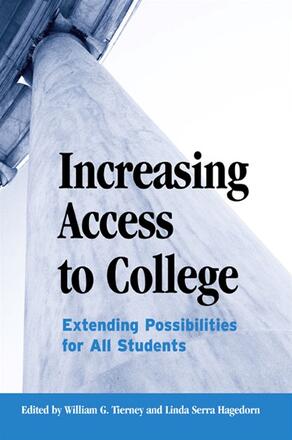
Increasing Access to College
Extending Possibilities for All Students
Alternative formats available from:
Focuses on pre-college enrichment programs as a solution to the problem of minority and low-income student access to postsecondary education.
Description
At a time when college enrollment rates for low income and under-represented students are far below those of non-minority students, policies and practices designed to increase access should be a priority for colleges, universities, high schools, and community agencies. Increasing Access to College examines pre-college enrichment programs that offer a specific and immediate remedy.
William G. Tierney is Professor of Higher Education and Director of the Center for Higher Education Policy Analysis, Rossier School of Education, University of Southern California. He is the editor of Faculty Work in Schools of Education: Rethinking Roles and Rewards for the Twenty-first Century, also published by SUNY Press. Also at the Rossier School of Education, University of Southern California, Linda Serra Hagedorn is Associate Professor of Education and Program Chair, Community College Leadership.
Reviews
"…an illuminating collection … on pre-college programs—how they may be conceptualized and what is known about their success in increasing access for underrepresented and underserved students. " — Planning for Higher Education
"In a country where its national leadership has vowed to leave no child behind, the ability to attend and complete postsecondary education must be available to all. This book provides a clear and thoughtful guide for practitioners and policymakers to deepen their understanding of which college preparation programs have the best chance of succeeding for all students. " — Joseph A. Aguerrebere, Deputy Director, The Ford Foundation
"This eminent group of scholars lifts the conversation about access for disadvantaged students to a higher level. By framing the issues with a philosophical, political, and socio-cultural foundation, we learn that efforts to increase access to college do not occur in a vacuum. " — Laura Rendon, Veffie Milstead Jones Endowed Chair in the College of Education, California State University, Long Beach
"There is no more important challenge for the future of the American workforce than that all of our college-capable youth enroll and succeed in college. Increasing Access to College addresses educational access and equity with skill and thoroughness, challenging us as a nation to find the right ways to build, develop, and evaluate what truly works. " — J. B. Schramm, Founder and Executive Director, College Summit